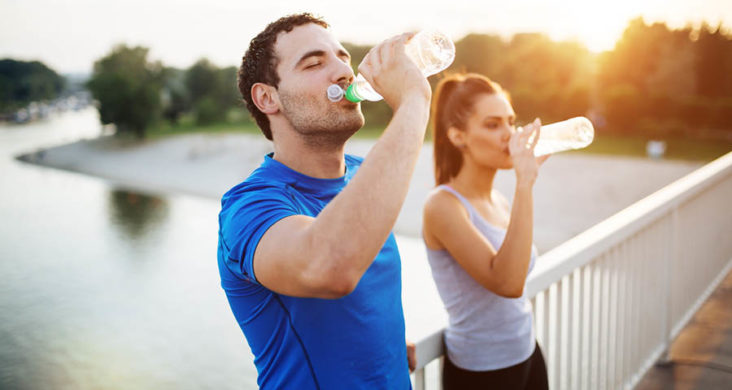At some point, someone has probably told you to “drink more water!” But is it really that important?
Simple answer…YES!
According to Nestle Waters, the adult body is made up of ~60% water…60%! Water has many important roles in your body, including…
- Regulating your body temperature
- Lubricating your joints
- Protecting your spinal cord/brain
- Ridding your body of wastes through urination, perspiration & bowel movements
- Delivering oxygen and nutrients throughout your body
- Forming saliva and aiding in the breakdown of food & proper digestion
Let’s dig a little deeper…
Your Brain
Headaches, poor concentration, and a decrease in short-term memory can all be linked to poor water intake because the brain is made up of 85% water. Lack of water = lack of energy production. According to Eden Springs, when your body is lacking just 1-2% of water it can have ill-effects on your ability to concentrate.
Your Heart & Lungs
As noted by Eden Springs, clinical studies have shown that adequate water intake can reduce the risk of developing heart disease. By simply drinking water you can potentially improve how your heart works…pretty cool. At 85%, your lungs consist of even more water than your heart. Water plays an important role in your ability to pull in oxygen and rid your body of carbon dioxide. If you are dehydrated, your body sparks a histamine reaction which will shut off the capillaries in your lungs. In short, this means that your body is attempting to prevent water loss but also making breathing more laborious in the process.
Your Liver & Kidneys
Your liver is made up of ~73% water. This organ plays a role of turning body fat into energy, however with lack of water consumption, the liver must switch roles to help your kidneys function properly. This means that the original role of your liver gets pushed aside and your body can accumulate extra fat. Your kidneys require water to effectively remove waste from your body. Insufficient water intake can cause kidney stones and can actually lead to kidney damage.
Your Bones and Joints
Water will help to protect and allow for smoother movement of your joints. Lack of water in your system can lead to increased friction in your joints which can cause degeneration, joint pain and can eventually result in arthritic conditions.
Your Muscles
Muscle spasms/cramps can occur for a variety of reasons…inadequate water intake is one of them. Your muscles need a certain amount of water and nutrients to be sure the proteins in your muscles can contract in an organized fashion. So, lack of water in your system may result in these involuntary, muddled and sometimes painful muscle spasms.
So how much water do you really need to drink each day?
You can lose ~2.5 L per day through urine, sweating, respiration, and bowel movements. This means you should match these losses through normal metabolic processes, food intake, and most importantly beverage intake. If you do not, you are at risk for dehydration and other negative effects which were mentioned above.
It is also important to note that your body will require additional water when in hotter climates, when running a fever, with diarrhea or vomiting, and with an increase in physical activity (for some of you this includes Physical Therapy).
Although there are multiple different recommendations based on past studies, Healthline.com states, “health authorities recommend 8, eight-ounce glasses” which is equivalent to approximately 2 liters or one half of a gallon. This may be a difficult goal for you to meet each day but here are some TIPS FOR INCREASING WATER INTAKE:
-carry a bottle of water everywhere you go
-set reminders on your phone
-drink water when dining out…you will save $$ too!
-at each meal, be sure to sit down with a glass of water
-add flavor: lemon, lime, raspberries, strawberries, etc. (you can freeze the fruit too!)
-alternate regular water with original seltzer water if you like the added carbonation
-drink from an attractive bottle
-if you feel hungry for a snack…drink a glass of water first (this may save you the calories!)
Now, let’s turn these tips into actions.
Ready…set…drink!
References:
Drinking Water. (2016, October 05). Retrieved January 12, 2018, from https://www.cdc.gov/healthywater/drinking/nutrition/index.html
How Much Water Should You Drink Per Day? (n.d.). Retrieved January 14, 2018, from https://www.healthline.com/nutrition/how-much-water-should-you-drink-per-day#modal-close
Hydration is the Core of Health. (n.d.). Retrieved January 10, 2018, from https://www.nestle-waters.com/
International Kidney Stone Institute. (n.d.). Retrieved January 14, 2018, from http://www.iksi.org/patients/education/tips-increasing-fluid-intake/
Project WET Foundation. (2010). Aqua bodies. Healthy Hydration, 13-38.
The Ultimate Guide on How to Increase Daily Water Intake. (2018, January 10). Retrieved January 29, 2018, from https://www.developgoodhabits.com/daily-water-intake/
Water for Health. (2016, May 24). Retrieved January 12, 2019, from https://www.edensprings.co.uk/water-health

